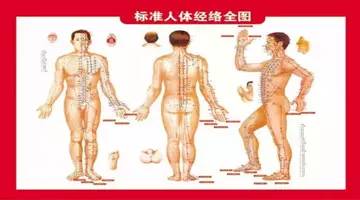
The Diagram and Explanation of the Twelve Meridians
Traditional Chinese Medicine (TCM) divides the day into twelve hours, represented by the twelve Earthly Branches, forming the theory of the Zi Wu Liu Zhu (Circadian Rhythm of Qi and Blood). This theory is a major component of TCM, studying the timetable of the circulation of Qi and blood in the human body.
TCM believes that the natural world and humans are a unified whole. The cyclical changes of the year, seasons, days, and hours in nature affect the physiological and pathological changes in humans, such as pulse patterns, spring tension, summer flood, autumn hair, and winter stone.
Changes in human health are often lighter in the morning, heavier at noon, and even heavier at night. These conditions are related to the circulation of Qi and blood in the body, meaning that at different times, Qi and blood flow through different meridians, directly influencing human physiology and pathology, similar to the biological clock effect proposed by modern science.
The theory of Zi Wu Liu Zhu posits that the circulation of Qi and blood in the human body follows a certain time cycle, forming a large circulation pathway. The connection sequence of the twelve meridians is as follows:
Its mnemonic:
At the Yin hour, Qi and blood flow into the lungs,
At the Yin hour, the large intestine, at the Chen hour, the stomach,
At the Si hour, the spleen, at the Wu hour, the heart, at the Wei hour, the small intestine,
At the Shen hour, the bladder, at the You hour, the kidneys,
At the Xu hour, the pericardium, at the Hai hour, the Sanjiao,
At the Zi hour, the gallbladder, at the Chou hour, the liver.
Understanding the operation and circulation rules of the body’s meridians throughout the day allows one to grasp every moment of life, starting with breathing. By relying on the meridians, one can comprehend the principles of Tai Chi, respect the order of Yin and Yang. All twelve meridians are connected to the source of life energy; Qi is the foundation of life, and time is its application!
Presenting the twelve hours and the human meridian timetable, hoping everyone can open the door to health:
1. 【Hand Taiyin Lung Meridian】
At the Yin hour (3 AM to 5 AM)—the lung meridian is strong. During the Yin hour, sleep is deep, complexion is red, and energy is abundant;
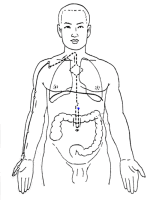
“The lungs govern the hundred vessels.” After the liver pushes the blood out during the Chou hour, it provides fresh blood to the lungs, which then distributes it throughout the body. Therefore, in the morning, people have a rosy complexion and abundant energy. During the Yin hour, those with lung diseases often report the most severe symptoms, such as severe coughing or asthma.
Excess Symptoms: Abdominal distension, constipation, prone to hemorrhoids, discomfort or pain in the shoulder and back, toothache, skin abnormalities, upper abdomen abnormalities, etc.
2. 【Hand Yangming Large Intestine Meridian】
At the Yin hour (5 AM to 7 AM)—the large intestine meridian is strong. During the Yin hour, the large intestine peristalses, expelling toxins; “The lungs and large intestine are interrelated.” The lungs fill the body with fresh blood, which then stimulates the large intestine to absorb water and nutrients from food and expel waste. It is best to have a bowel movement after getting up in the morning.
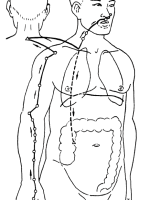
Health Tip: Get up quickly, drink a cup of warm water after getting up, and then rush to the toilet to expel the waste accumulated throughout the day! However, do not rush too much; many elderly people suffer strokes because of this. It is better to rest for 10-20 minutes to clear the mind before going. Recommended foods include: eggplant, spinach, bananas, mushrooms, black fungus, corn, lentils, peas, etc.
Deficiency Symptoms: Easily hungry, weak stomach, abnormal joints, abnormal appetite, dry mouth, prone to constipation.
3. 【Foot Yangming Stomach Meridian】
At the Chen hour (7 AM to 9 AM)—the stomach meridian is strong. During the Chen hour, breakfast nourishes the body;
During this time, breakfast is easiest to digest and absorb. Breakfast can include gentle, stomach-nourishing foods such as congee, oatmeal, and buns. Foods that are too hot can easily cause stomach fire, leading to dry, cracked lips and sores. Skipping breakfast can lead to various diseases.
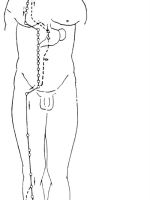
Deficiency Symptoms: Spleen and stomach disharmony, poor digestion and absorption, prone to abdominal distension and belching, headaches, fatigue, abnormal knee joints, abnormal bowel movements, etc.
Health Tip: It is important to have breakfast at this time. If you do not provide food, the stomach will continue to secrete gastric acid. If you go hungry for too long, you risk developing gastric ulcers, gastritis, duodenitis, cholecystitis, etc.! After meals, massaging the stomach meridian can help regulate gastrointestinal function.
4. 【Foot Taiyin Spleen Meridian】
At the Si hour (9 AM to 11 AM)—the spleen meridian is strong. During the Si hour, the spleen is strong, producing blood for the body; “The spleen governs transportation and transformation, and the spleen controls blood.” The spleen is the main regulator of digestion, absorption, and excretion, and it also governs the blood in the body. “The spleen opens to the mouth, and its manifestation is on the lips.” When the spleen functions well, digestion and absorption are good, and blood quality is high, resulting in rosy lips. Pale lips indicate insufficient blood and Qi, while dark or purple lips indicate cold entering the spleen meridian.
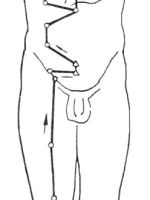
Health Tip: Spleen and stomach disharmony, poor digestion and absorption, spleen deficiency can lead to decreased memory, etc. This time is the best time for the spleen meridian to open its acupoints and operate. It is also the best time to protect the spleen. As lunch approaches, it is recommended to choose foods such as lentils, sweet potatoes, potatoes, tofu, celery, corn, and rice. Fruits can include apples, oranges, lemons, and tangerines. Teas can include green tea, flower tea, and honey water.
5. 【Hand Shaoyin Heart Meridian】
At the Wu hour (11 AM to 1 PM)—the heart meridian is strong. During the Wu hour, a short rest calms the mind and nourishes the Qi; “The heart governs the spirit, opens to the tongue, and its manifestation is on the face.” The heart Qi promotes blood circulation, nourishing the spirit, Qi, and tendons.
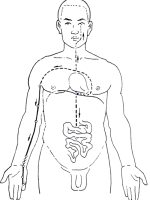
During the Wu hour, a short nap is very beneficial for heart health, allowing one to be energetic from the afternoon to the evening.
6. 【Hand Taiyang Small Intestine Meridian】
At the Wei hour (1 PM to 3 PM)—the small intestine meridian is strong. During the Wei hour, clarity and turbidity are distinguished, and drinking water can reduce heat; the small intestine separates clear from turbid, sending fluids to the bladder and waste to the large intestine, while the essence is sent to the spleen. The small intestine meridian adjusts the nutrition of the body during the Wei hour. If there is heat in the small intestine, one may experience dry cough and flatulence. Drinking more water and tea at this time is beneficial for the small intestine to expel heat.
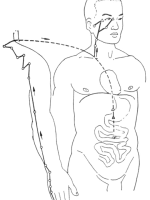
7. 【Foot Taiyang Bladder Meridian】
At the Shen hour (3 PM to 5 PM)—the bladder meridian is strong. During the Shen hour, body fluids are abundant, nourishing Yin and providing comfort; the bladder stores and expels fluids, circulating body fluids internally. If there is heat in the bladder, it can cause bladder cough and urinary incontinence. The body temperature is relatively high during the Shen hour, which is most pronounced in those with Yin deficiency. Appropriate activity at this time helps circulate body fluids, and drinking teas that nourish Yin and clear heat is most effective for those with Yin deficiency.
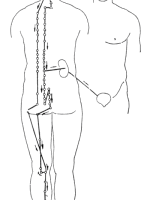
If there is heat in the bladder, it can cause bladder cough and urinary incontinence. The body temperature is relatively high during the Shen hour, which is most pronounced in those with Yin deficiency. Appropriate activity at this time helps circulate body fluids, and drinking teas that nourish Yin and clear heat is most effective for those with Yin deficiency.
8. 【Foot Shaoyin Kidney Meridian】
At the You hour (5 PM to 7 PM)—the kidney meridian is strong. During the You hour, the kidneys store essence and absorb the clear vital energy;
“The kidneys store reproductive essence and the essence of the five organs and six bowels. The kidneys are the root of pre-natal energy.” After the body expels heat and detoxifies during the Shen hour, the kidneys enter a phase of storing essence during the You hour. It is not suitable for intense exercise or excessive water intake at this time.
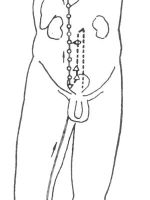
“The kidneys store reproductive essence and the essence of the five organs and six bowels. The kidneys are the root of pre-natal energy.” After the body expels heat and detoxifies during the Shen hour, the kidneys enter a phase of storing essence during the You hour. It is not suitable for intense exercise or excessive water intake at this time.
9. 【Hand Jueyin Pericardium Meridian】
At the XU hour (7 PM to 9 PM)—the pericardium meridian is strong. During the XU hour, protect the heart, relieve pressure, and promote heart comfort; “The pericardium is the outer membrane of the heart, with vessels attached, serving as the pathway for Qi and blood. Evil cannot reside here, as it harms the heart.” The pericardium is the protective tissue of the heart and also a pathway for Qi and blood.
The pericardium meridian is most active during the XU hour, clearing external evils around the heart, keeping the heart in a healthy state. It is essential to maintain a pleasant mood at this time: read, listen to music, do spa, dance, or practice Tai Chi… relax and release stress.
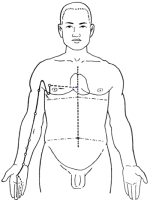
“Evil cannot reside here, as it harms the heart.” The pericardium is the protective tissue of the heart and also a pathway for Qi and blood. The pericardium meridian is most active during the XU hour, clearing external evils around the heart, keeping the heart in a healthy state. It is essential to maintain a pleasant mood at this time: read, listen to music, do spa, dance, or practice Tai Chi… relax and release stress.
10. 【Hand Shaoyang Sanjiao Meridian】
At the Hai hour (9 PM to 11 PM)—the Sanjiao meridian is strong. During the Hai hour, the hundred vessels are open, nourishing the body and enhancing beauty. The Sanjiao is the largest of the six fu organs, responsible for managing Qi and unblocking water pathways. The Sanjiao can open the hundred vessels during the Hai hour.
If a person sleeps during the Hai hour, the hundred vessels can receive the best rest and recovery, which is very beneficial for health and beauty. A common characteristic of centenarians is that they sleep during the Hai hour. If modern people do not want to sleep at this time, they can listen to music, read, watch TV, or practice yoga, but it is best not to stay awake past the Hai hour.
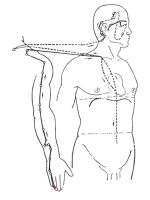
If a person sleeps during the Hai hour, the hundred vessels can receive the best rest and recovery, which is very beneficial for health and beauty. A common characteristic of centenarians is that they sleep during the Hai hour. If modern people do not want to sleep at this time, they can listen to music, read, watch TV, or practice yoga, but it is best not to stay awake past the Hai hour.
11. 【Foot Shaoyang Gallbladder Meridian】
At the Zi hour (11 PM to 1 AM)—the gallbladder meridian is strong. During the Zi hour, sleep deeply, and dark circles do not appear; TCM theory states, “The excess Qi of the liver is discharged into the gallbladder, where it is concentrated and refined.” If a person sleeps before the Zi hour, the gallbladder can complete its metabolism. “The clearer the bile, the clearer the brain.”
If one sleeps before the Zi hour, they will wake up with a clear mind, rosy complexion, and no dark circles. Conversely, those who often cannot sleep before the Zi hour will have a pale complexion, dark circles, and may easily develop crystals or stones due to poor bile detoxification and metabolism.
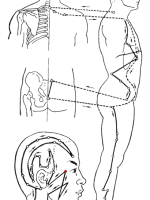
If a person sleeps before the Zi hour, the gallbladder can complete its metabolism. “The clearer the bile, the clearer the brain.” If one sleeps before the Zi hour, they will wake up with a clear mind, rosy complexion, and no dark circles. Conversely, those who often cannot sleep before the Zi hour will have a pale complexion, dark circles, and may easily develop crystals or stones due to poor bile detoxification and metabolism.
12. 【Foot Jueyin Liver Meridian】
At the Chou hour (1 AM to 3 AM)—the liver meridian is strong. During the Chou hour, if one does not sleep, spots will appear on the face; TCM theory states, “The liver stores blood.” “When a person sleeps, blood returns to the liver.”
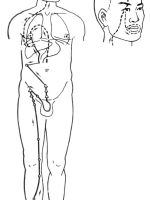
If one cannot sleep during the Chou hour, the liver continues to output energy to support thinking and action, failing to complete metabolism. Therefore, those who cannot sleep before the Chou hour will have a grayish complexion, emotional sluggishness, and are prone to liver diseases, with a dull complexion and spots.
Health Tip: At this moment, the body needs a lot of oxygen, requiring deep sleep. If you wake up coughing, it is best to drink a cup of warm water to relieve it and also to alleviate lung dryness. Recommended foods include: cabbage, pears, tofu, soy milk, and milk.
Deficiency Symptoms: Decreased skin immunity, cold hands and feet, numbness, dry throat, cough, etc.
Excess Symptoms: Difficulty breathing, throat abnormalities, chest tightness, wheezing, tonsillitis, cough, shoulder and back pain, prone to hemorrhoids, etc.
Currently, over 10,000 people have followed us
——Recommended Reading——
Note: The various prescriptions and remedies mentioned in this article are for reference and study by professional TCM practitioners only and should not be used as prescriptions. Please do not use them blindly; this platform does not bear any responsibility for any consequences arising from this.
Copyright Statement: We focus on sharing; the articles and images come from the internet, and the copyright belongs to the original author. If there are any objections, please inform the editor, and we will delete them promptly.
Previous Popular Articles Recommended:
※Click → Symptom Inquiry
※Click → 24 Types of Hand Diagnosis in TCM (Worth Referencing)
※Click → TCM Observation Diagnosis, Everyone Can Learn!
※Click → Pulse Diagnosis: TCM Twenty-Eight Pulse Classification Song (Animated Explanation)
Add fuel to health, like + view
